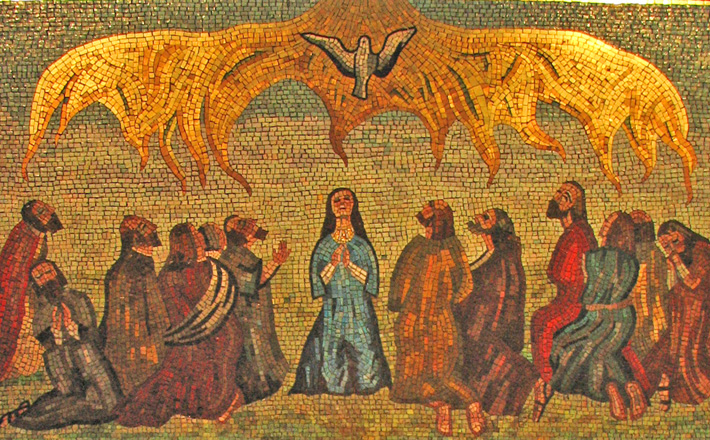Commentary on Acts 2:1-21
The Pentecost lectionary account takes place in Jerusalem on the feast day of Shavuot, 50 days after Passover in the Jewish calendar.
This story follows Luke’s retelling of the ascension of Jesus (Acts 1:1–12; see also Luke 24:50–53), the gathering of Jesus’ followers in Jerusalem—some 120 in all (Acts 1:15), and the choice of a 12th man to replace Judas (Acts 1:16–26). These can be understood as prologue, for the Pentecost narrative catalyzes the action in the rest of The Acts of the Apostles.
Luke’s narrative describes the completion of what John the Baptist began (Acts 1:5). It describes not the birth of the church but, rather, the empowerment of the believers to bear witness to the ends of the earth, as promised in Acts 1:8. Following this passage, we hear Peter’s interpretation of the events of Jesus’ death, resurrection, and status as God’s Messiah (Acts 2:22–36). The result of Peter’s speech, according to Luke, is the conversion of thousands, and the communitarianism of the earliest churches (Acts 2:37–d47).
Today’s lectionary passage begins with the 120 gathered together (Acts 2:1; see also, Acts 1:15). Luke then describes the coming of the Holy Spirit as the sound of a rushing wind, an apparition of tongues resting on each, and the gift of the ability to speak in other languages (2:2–4). The narrative turns next to the outsiders who witness this spectacle (2:5–13). These include immigrants to Jerusalem from all over the Mediterranean basin (2:8–11). The lectionary ends only nine verses into Peter’s much lengthier address, with a quotation from Joel 2.
Exegetical notes
“When the day of Pentecost had come”: Although contemporary Jews commemorate the holy gift of the Law, Torah, at Mount Sinai on Shavuot, it is not clear whether the ancient harvest festival carried that meaning in Luke’s day. Whether or not it did, Luke’s narrative serves as a Christian appropriation and reinterpretation of the festival day.
“There came a sound like the rush of a violent wind”: Acts 2:2–4 comprises one long sentence describing the coming of the Holy Spirit. This is no gentle in-breaking. The Spirit comes suddenly (aphno), even violently (biaias), upon the gathered. Fiery tongues appear and settle on each of them (Acts 2:3). Luke makes no distinction here with regard to gender, as he will in other parts of Acts. Then the gathered begin to speak in “other tongues” (2:4) as enabled by the Spirit. The later verses in this passage clarify that these are known languages of the Mediterranean basin, rather than the spiritual language that Paul calls glossolalia in 1 Corinthians 12–14.
“Now there were devout Jews”: Acts 2 focuses on the growth of belief in Jesus among Jews, not among Gentiles as will be the case in Acts 10. Moreover, these are not pilgrims to the harvest festival; they are immigrants, inhabitants of Jerusalem (Acts 2:5). Their homelands encircle Palestine in all directions (2:9–11). Further, they have mother tongues other than the languages of Palestine (Acts 2:8, 11). This points to the cultural diversity of Jews of Luke’s day, likely caused in part by various diasporas.
“All were amazed and perplexed”: Here, “amazed” should be considered a less-than-pleasant emotion. This is not the joy of a child seeing a magic trick. These have gathered because they also heard the violent wind (Acts 2:6). Their sentiment is closer to bewilderment; they are flummoxed by all of the signs and portents. Some, of course, mock the happenings as a scene caused by people drunk on new wine (2:13). Luke uses their question “What does this mean?” to launch into Peter’s speech.
“But Peter, standing with the eleven, raised his voice”: In Acts, standing sometimes precedes an important oration (Acts 17:22). Peter delivers his address, here, with the other 11 male apostles. He addresses first Judean men (andres Ioudaioi), but also the crowd of immigrants gathered with them, whom he calls “you who live in Jerusalem” (katoikountes; 2:14).
“This is what was spoken through the prophet Joel”: The lectionary ends before we hear what Peter himself preaches. Instead, today’s reading closes with a quotation from the prophet Joel (Acts 2:16–21; Joel 2:28–32a). In its original context, this passage follows a prophecy comparing the coming of the day of the Lord to that of a devastating army (Joel 2:1–11). The prophet declares fasting and repentance as the people’s appropriate response to the fearful coming of the wrath of the day of the Lord (2:12–18).
The result is both a near reprieve—the removal of the northern army—and the promise of an eschatological hope, the pouring out of God’s Spirit. Luke uses this eschatological section as an interpretative lens for the violent, multilingual Pentecost outpouring. As in the days of Joel, the portents of God’s in-breaking are terrifying—blood, smoke, fire, and a solar eclipse (Acts 2:19–20; Joel 2:30–31). However, God’s coming also brings people to prophetic speech: women and men, slave and free. And all who call on God’s name will be saved (Acts 2:21; John 2:32a).
Theological considerations
In Luke’s telling, Pentecost engenders fear and bewilderment rather than celebration. The parallel here is to the eschatological day of the Lord. Pentecost is both its forerunner and, paradoxically, its fulfillment.
The Holy Spirit proves not to be a quiet, heavenly dove but, rather, a violent force that blows the church into being (Acts 2:41–47). That church consists mainly of immigrants, people of different languages and cultures with different mother tongues (Acts 2:5, 9–12, 14). To these, the message goes forth: a message of the coming of the day of the Lord, full of heavenly portents and prophetic women, slaves, and men. But in the midst of the chaos of Pentecost rests an anchor: Everyone who calls on the name of the Lord shall be saved.


June 4, 2017